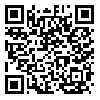1. World Health Organization (WHO), News Fact sheets, Detail, Cancer 2015.
2. Shobiri E, Amiri M, Haghighat MJ, et al. The diagnostic value of impedance imaging system in patients with breast mass. J Kermanshah Univ Med Sci. 2016; 19(7): 427-35.
3. Paul S, Solanki PP, Shahi UP, Srikrishna S. Epidemiological study on breast cancer associated risk factors and screening practices among women in the holy city of Varanasi, Uttar Pradesh, India. Asion Pac J Cancer Prev. 2015; 16(18): 8163-71. [
DOI:10.7314/APJCP.2015.16.18.8163] [
PMID]
4. Hoseini S, Nasrolahi B, Aghili M. Prediction of hope of life based on spiritual well-being and psychological hardiness in women with breast cancer. Arch Breast Cancer. 2017; 4(4): 136-40.
5. Karimi H, Sam S. Effect of breast self-examination (BSE) education on increasing women's knowledge and practice, Ramsar. J Badol Univ Med Sci. 2005; 7(3): 61-8.
6. Yoo BN, Choi KS, Jung KW, Jun JK. Awareness and practice of breast self-examination among Korean women: results from a nationwide survey. Asian Pac J Cancer Prev. 2012; 13(1): 123-5. [
DOI:10.7314/APJCP.2012.13.1.123] [
PMID]
7. Kashfi S, Khani Jeihooni A, Yazdankhah M. The effect of education about breast self-examination on knowledge, attitude, and practice of women in nourabad mamasani health clinics, 2009. Pars J Med Sci.2012; 10(1): 40-5. [
DOI:10.29252/jmj.10.1.40]
8. Avci IA. Factors associated with breast self-examination practices and beliefs in female workers at a muslim community. Europ J Oncol Nurs. 2008; 12(2): 127-33. [
DOI:10.1016/j.ejon.2007.11.006] [
PMID]
9. Sevil U, Atan SU, Kiris H, et al. Peer education project on breast self-examination in Izmir, Turkey. Asian Pac J Cancer Prev. 2005; 6(1): 29-32.
10. Motamedi B, Yazdanpanah F, Iranmanesh F, Tirgary B. Effect of education on the sustainability of breast self-examination among health care volunteers in Kerman, Iran. J Health Develop. 2012; 1(3): 167-73.
11. Ghasemi B, Keivani Z. The effect of breast self-examination training on knowledge, attitude and practice of women working in Shahrekord universities in 2010. J Clin Nurs Med Wife. 2014; 3(2): 30-6.
12. Pourhaji F, Vahedian Shahroodi M, Esmaily H, Pourhaji F. Knowledge, beliefs, and health behaviors in those volunteering health in Mashhad, 2012. Iran J Breast Disease. 2013; 5(4): 44-52.
13. Pakpour Hajiagha A, Mohammadi Zeidi I, Mohammadi Zeidi B. The impact of health education based on theory of planned behavior on the prevention of AIDS among adolescents. Iran J Nurs (2008-5923). 2012; 25.
14. Glanz K, Rimer B, Viswanath K. Health behavior and health education:theory, research, and practice: John Wiley & Sons.2008.
15. Pro-Change. The transtheoretical Model 2018. Available from: https://www.prochange.com/transtheoretical-model-of-behavior-change.
16. Pourhaji F, Vahedian Shahroodi M, Esmaily H, Pourhaji F, harooni J. Effects of training program-based on stage of change model to promote breast self-examination behavior. Avicenna J Nurs Midwifery care. 2013; 21(4): 59-68.
17. Ghahremani L, Mousavi Z, Kaveh MH, Ghaem H. Self-care education programs based on a trans-theoretical model in women referring to health centers: breast self-examination behavior in Iran. Asian Pac J Cancer Prev. 2016; 17(12): 5133-8.
18. Abbastabar H, Hamidi Fard P, Roustazadeh A, et al. The relationship between breast cancer and the most common noncontagious disease risk factors: an ecologic study. Asian Pac J Cancer. 2013; 14: 5123-5. [
DOI:10.7314/APJCP.2013.14.9.5123] [
PMID]
19. Jamshidi M, Aliramaji A, Khafri S, Moudi E. Relationship between the breast cancer history and prostate cancer in relatives with prostate cancer. J Babol Univ Med Sci. 2017; 19(8): 7-11.
20. YektaKooshali M, Esmaeilpour-Bandboni M, Sharemi S, Alipour Z. Survival rate and average age of the patients with breast cancer in iran: systematic review and meta-analysis. J Babol Univ Med Sci. 2016; 18(8): 29-40.
21. Vahedian Shahroodi M, Pourhaje F, Esmaily H, Pourhaje F. The relationship between breast self-examination and stages of change model in health volunteers. J Res Health. 2015; 5(1): 13-20.
22. Elkazeh E, Elsaay OEA. Applying the transtheoretical model of change and the health belief model to breast self-examination in females undergraduate students in faculty of nursing tanta University. J Am Sci. 2012; 8(8): 804-14.
23. Jalilian M, Darabi M, Sharifirad G, Kakaei H. Effectiveness of interventional program based on trans-theoretical model to promote regular physical activity in office workers. J Health System Res. 2012; 9(2): 188-95.
24. Khiyali Z, Aliyan F, Kashfi2 SH, Mansourian M, Khani Jeihooni A. Educational intervention on breast self-examination behavior in women referred to health centers: Application of Health Belief Model. Asian Pac J Cancer Prev. 2017; 18(10): 2833-8.
25. Masoudiyekta L, Rezaei-Bayatiyani H, Dashtbozorgi B, Gheibizadeh M, Saki Maleh A, Moradi M. Effect of education based on health helief model on the behavior of breast cancer screening in women. Asia Pac J Oncol Nurs. 2018; 5(11): 114-20.
26. Bakhtariagdam F, Nourizadeh R, Sahebi L. The role of health belief model in promotion of beliefs and behaviors of breast cancer screening in women referring to health care centers of Tabriz in 2010. J Tabriz Uni Med Sci. 2012; 33(6): 25-31.
27. Nahidi F, Dolatian M, Roozbeh N, Asadi Z, Shakeri N. Effect of health-belief-model-based training on performance of women in breast self-examination. Electron Physician. 2017; 9(6): 4577-83. [
DOI:10.19082/4577] [
PMID] [
PMCID]
28. Ouyang YQ, Hu X. The effect of breast cancer health education on the knowledge, attitudes, and practice: a community health center catchment area. J Cancer Educ. 2014; 29(2): 375-81. [
DOI:10.1007/s13187-014-0622-1] [
PMID]
29. Tuzcu A, Bahar Z, Gözüm S. Effects of interventions based on health behavior models on breast cancer screening behaviors of migrant women in Turkey. Cancer Nurs. 2016; 39(2): 40-50 . [
DOI:10.1097/NCC.0000000000000268] [
PMID]







